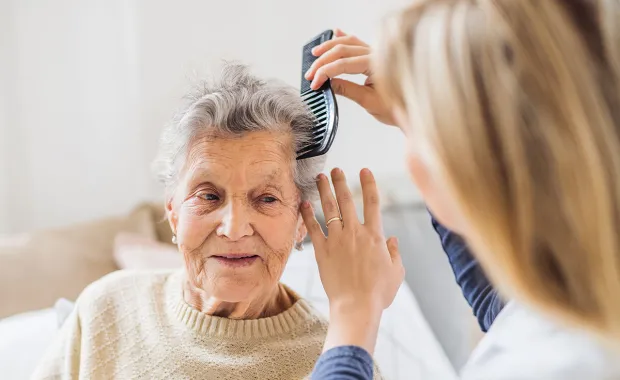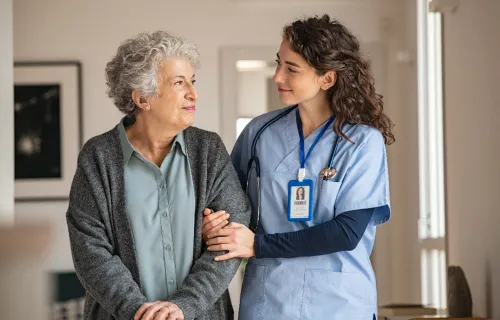Experts from Delta Wellbeing and CGI discuss how health and care organisations are managing the real mixed economy of new technologies trying to work alongside old.
In the first of our series focusing on digital health and care, we look at today’s challenges and how the right digital technology can overcome these and pave the way for a new model of care, putting patients first at the heart of the services being delivered.
Join our experts as they discuss the day-to-day challenges faced in the health and care sector and the changing perspective on technology-enabled care.
Meet the speakers
- Transcript
-
Divya: Hello and welcome to our first in a three-part podcast series, focusing on digital health and care, where we will not only be looking at the current challenges in the marketplace, but how the right digital technology and strategic partnerships can overcome these and pave the way for a new model of care, putting the patients first at the heart of the services being delivered. My name is Divya Bedi, project manager, CGI and I will be your host for the series. CGI has been selected by Delta Wellbeing as its long-term strategic partner to improve health and social care in West Wales and beyond.
Through its new digital transformation programme, the Delta CONNECT programme is transforming the way health and social care is delivered, implementing a new model of self-help and proactive care to improve wellbeing, help people stay independent and reduce demands on long-term or acute health and social care problems.
The initial focus of this partnership between CGI and Delta is the digitization of Delta Wellbeing's Telecare services in preparation for the upcoming analogue switch off in 2025, creating a platform for new digital health and care service delivery.
We are kicking off with the first of our three podcasts today where we are considering the current challenges we are facing and the role technology has in overcoming them. Today with me, we have Paul Faulkner, head of technologies from Delta Wellbeing-
Paul Faulkner: Hello.
Divya: -and Stuart Parsons, Director Consulting Services for Health and Care from CGI.
Paul Faulkner: Hey, Divya.
Divya: Let me start by asking the first question. In the health and care industry, what challenges are you currently facing in your day-to-day operations?
Paul Faulkner: I think for us at Delta, there's still the legacy, I suppose, of what technology-enabled care, or tech as we call it, what that actually is. A lot of people living at home, a lot of clinicians out in the health and social care think of tech as a service that will keep somebody safe at home. They think of tech as smoke detectors, pendants that people can wear at home to keep people safe and sound in that environment.
It's so much more than that now, that what we've got to do is to make sure that our colleagues in health and social care and our communications with our citizens, that it's fully understand what technology can do. I think up until recently, tech has been a very reactive service. It will tell you when something's already happened, which obviously has its place and it is essential for a lot of the services that are out there at the moment. There's much more that we can do now with the technology that's with us. It's making sure that we are getting that message across.
A lot of organisations out there that use technology, but perhaps their main business is something like a housing association, they're still reliant on an older service Getting that older service and the systems within it to speak and marry up with new digital systems, that is going to take a little bit of time to sort that out. A lot of the work that we are doing now is communications with citizens and teams within health and social care just to ensure that we are all moving at the correct speed towards the end of 2025 and that the services that are currently in place are ready for that switch.
Stuart Parsons: Yes, I think I'd agree. I think Paul said, I think there's been a real evolution in the last couple of years and all of a sudden this new technology in the sector. We're venturing into a real mixed economy, new technologies trying to work alongside old technologies that can prove difficult without expertise and the real focus on the kind of integration requirements and activities needed to create a single experience and that kind of single service model as Paul has said.
Divya: How do you think we can go about addressing these challenges?
Paul Faulkner: Delta and CGI working together now to develop a service that will add significant value to the work that health and social care teams carry out by developing, I suppose, the art of the possible, and showcasing how digital technology can deliver a truly proactive approach to care rather than this reactive approach that has been there in the past, with the technologies that we've got now and the new technologies that are emerging. We are able to engage with health and social care teams to demonstrate new digital solutions and also to understand where tech can support people in the community.
As we work with tech equipment companies and companies at the cutting edge of tech system development, we must ensure that colleagues in health and social care and organisations across the care sector are involved in new system development. It's key that Delta and CGI fully understand where the gaps are in the service provision that where health and social care colleagues may have and use technology to marry with systems so that we're getting the data and the outcomes that that's really valuable to those teams out in the communities today.
Stuart Parsons: It would be remiss to me as well not to mention the costs associated with all this change as well, Divya, and the need for us to create a cost-effective approach and strategy to ensure that these services remain affordable as well within the service and perhaps citizens and also our organizations who are delivering these services to. We've got a real need to look at things holistically and think about not only what the right technical answer to the question is, but also one that is efficient and effective as well.
Divya: Absolutely, agreed. With all this new technology you mentioned that we'll be putting in place, what do you think would be the impact of the analogue switch-off on this industry?
Paul Faulkner: There's still a lot of work to do before the end of 2025. There are many organisations that use tech as part of their service. I'm talking about things like housing associations, but it's not their main area. It's not their main service. They haven't been able to prioritise the work and the expenditure that they've got to put into the systems that they've currently got, so that everything's aligned in readiness for the digital switch and to allow them to audit the tech equipment that they have.
As mobile connections across the UK will become even more important by 2025, there's still a lot of work that needs to be done by mobile network suppliers to get adequate network coverage across the UK so that the systems work as they should be working. There's a lot of new digital tech coming. We need to continue to understand the systems and the services that our customer and the organisations that we work with, and what they need.
We can then marry the new equipment, the new systems that are coming on board to fill those gaps and to give the opportunities with the new digital services and equipment that's coming out of the market now. This may mean using equipment in different ways to get the right results for teams and the right information coming in, so it's a full wraparound service then for our partners in health and social care.
Stuart Parsons: Yes. For me, I think when a change of this nature occurs and there's a lot of work to be done, right, like Paul just mentioned. The tech needs to react to this, but I think it's really important to keep a positive spin on the work that we can do now. The impact is significant, yes. Given all the legacy technologies present, there's also a real opportunity for us to think from a system-wide perspective and think about using this change for the good of the sector and the change that's required. Thinking about approaching things differently, and within that, being able to create a more personal experience for our citizens, I think it's just full of opportunity for us as well.
Divya: Yes. Just on that, how do you think we can use innovation and technology all together to bind everything together for us?
Paul Faulkner: I think it's getting proactive now. We keep in regular touch with all of our customers or suppliers to understand where everybody is in their own digital journey and share best practice to support as many people as we can in the transition. There's a number of conferences now out there that we can all join in, and be part of to make sure that everybody is aware of this change that will take place by the end of 2025. It's already happening now. There are systems and equipment that we can use now, and lots of areas throughout the UK are moving to digital now. I think Delta and CGI are well-positioned to showcase the new digital tech service and how we can support individuals at home, support organisations that use tech to support their service and teams within health and social care.
I think demonstrating equipment that will not just have that safety net that tech was all about quite some time ago and still has an important role now, but to use equipment to allow our citizens to live their normal life and to use the data that the systems capture to look at somebody's health before something happens, to be a truly proactive service for those in those needs. A lot of the work that we'll do now is just preparing really for that switch by the end of 2025 and making sure that everybody is far enough down the road with their digital journey.
Stuart Parsons: I'm going to echo what Paul said here. I think this is probably one of the easier questions you've asked us, Divya, because for me it's all about using the new technology, the data that's going to be captured and just concentrating now on that data analytics piece. We were going to be moving toward a view of an individual's pattern of living, understanding more about them.
We can use that to just tailor services and an approach for them in terms of our joint understanding then of the care they require and how we can help. This is our genuine chance to turn information into actionable insight and just create a better service that we're going to be continuing to provide for those in our care.
Divya: Absolutely, it is about making things easier for everyone out there, isn't it?
Paul Faulkner: Definitely, yes.
Divya: Thank you for your time today. I hope you found this very informative and some great points were raised by both Paul and Stuart. I hope you're excited for the next podcast where we will continue this conversation forward, this time focusing on the future of healthcare with Carla Dix. If you want to find out more, please visit the CGI website or reach out to us on LinkedIn. Thank you.
[00:12:29] [END OF AUDIO]





